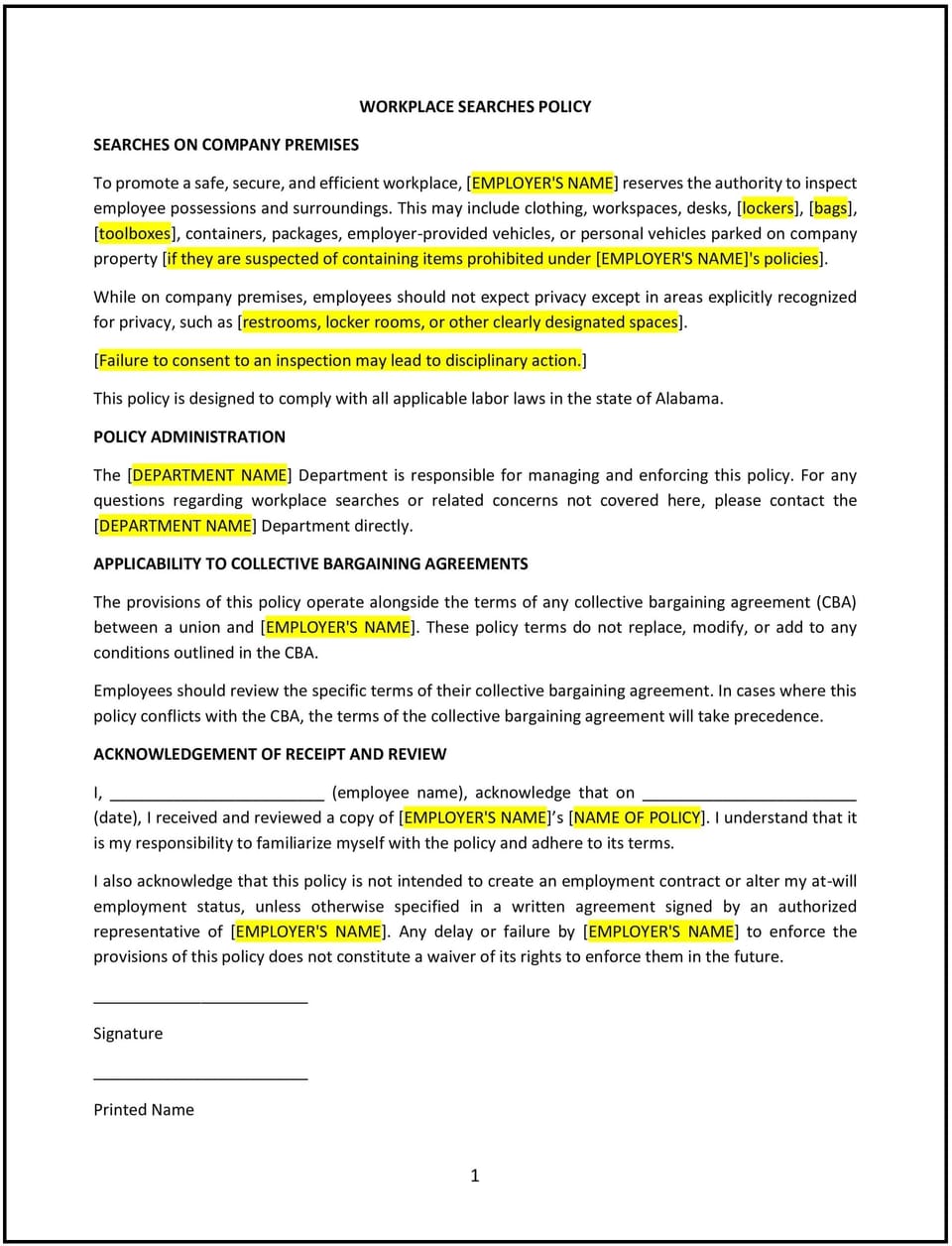Workplace searches policy (Alabama): Free template

Workplace searches policy (Alabama)
A workplace searches policy provides clear guidelines for conducting searches of company property, employee workspaces, and personal belongings in compliance with legal and privacy considerations. For SMBs in Alabama, this policy helps balance workplace security with employee rights, ensuring a transparent and respectful approach to maintaining a safe and productive environment.
This policy outlines the circumstances under which searches may occur, the process for conducting them, and the roles and responsibilities of employees and management.
How to use this workplace searches policy (Alabama)
- Define scope: Specify what may be subject to searches, such as desks, lockers, company vehicles, and electronic devices owned by the business.
- Establish conditions: Outline the situations warranting a search, such as suspected policy violations, theft, or safety concerns, ensuring they align with Alabama and federal laws.
- Communicate expectations: Inform employees about the policy during onboarding and in handbooks, emphasizing transparency and fairness.
- Detail the process: Include steps for conducting searches, such as obtaining managerial approval, maintaining confidentiality, and documenting the search.
- Address employee rights: Clearly state that searches will be conducted respectfully and within legal limits, protecting employee privacy where possible.
Benefits of using a workplace searches policy (Alabama)
A workplace searches policy helps SMBs maintain a secure environment while respecting employee rights. Here’s how it helps:
- Enhances security: Deters theft, misuse of company property, and other violations by establishing clear protocols for searches.
- Promotes transparency: Builds trust by ensuring employees understand the purpose and scope of workplace searches.
- Reduces liability: Ensures searches comply with Alabama and federal laws, minimizing legal risks.
- Supports fairness: Provides a consistent framework for handling search situations across all employees.
- Protects company assets: Safeguards against misuse or theft of company property and sensitive information.
Tips for implementing a workplace searches policy (Alabama)
- Clearly communicate the policy: Ensure employees are aware of the policy and its purpose through training, onboarding, and employee handbooks.
- Obtain legal guidance: Consult with legal professionals to ensure the policy complies with Alabama laws and respects employee privacy rights.
- Document search procedures: Keep records of searches, including the reasons, findings, and steps taken, to maintain accountability.
- Use searches as a last resort: Consider alternative approaches before conducting a search to maintain trust and avoid unnecessary conflicts.
- Provide training for managers: Train supervisors on how to handle search situations professionally and within legal boundaries.
Q: What areas can SMBs include in a workplace search policy?
A: The policy can cover company-owned property such as desks, lockers, vehicles, and digital devices, while respecting employee privacy where appropriate.
Q: Under what circumstances should a search be conducted?
A: Searches may be conducted if there is reasonable suspicion of policy violations, theft, safety concerns, or other workplace misconduct.
Q: How should SMBs handle employee privacy during searches?
A: Searches should be conducted respectfully and within legal limits, avoiding overly invasive practices and ensuring confidentiality.
Q: Can employees refuse a workplace search?
A: While employees may object, the policy should clarify that refusal could result in disciplinary action if the search aligns with company policy and legal standards.
Q: How can SMBs ensure compliance with Alabama laws?
A: Consult legal counsel to confirm the policy complies with state and federal regulations and clearly communicates employee rights.
Q: How often should this policy be reviewed?
A: Review the policy annually or when legal or operational changes occur to ensure ongoing compliance and relevance.
This article contains general legal information and does not contain legal advice. Cobrief is not a law firm or a substitute for an attorney or law firm. The law is complex and changes often. For legal advice, please ask a lawyer.


